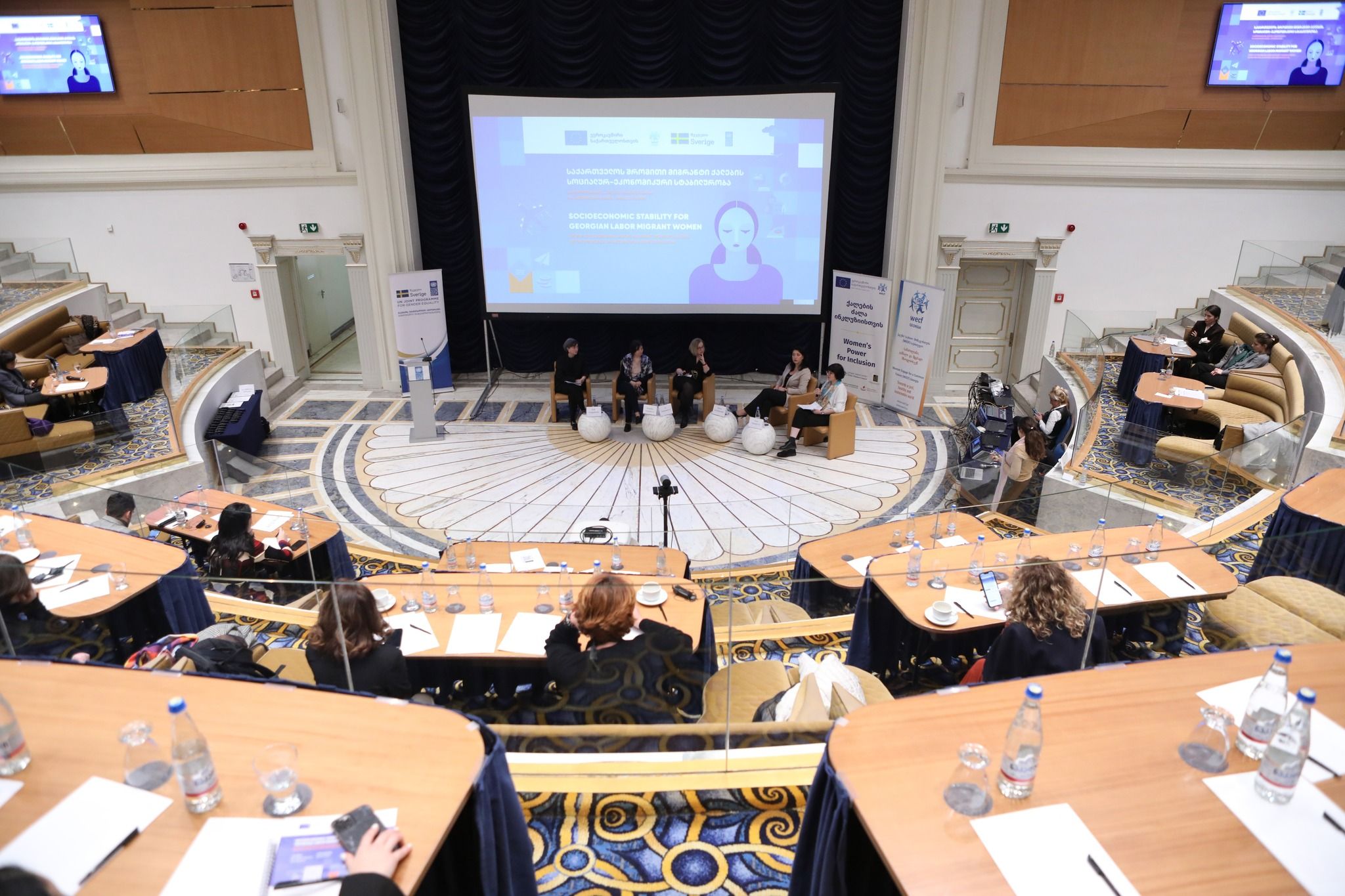
New Research Sparks Discussion on Challenges Faced by Labour Migrant Women in Georgia
EU, Sweden, and UNDP Join Hands with WECF – Georgia, to Support Labour Migrant Women’s Return and Reintegration.
UNDP, in partnership with “Women Engage for a Common Future (WECF) – Georgia” civil society organization, unveiled a comprehensive study shedding light on the challenges encountered by labour migrant women upon their return to Georgia.
This eye-opening research, supported by Sweden and the European Union, serves as a vital resource for the Georgian Government, civil society, and the private sector. It aims to address the pressing social and economic needs of labour migrant women and dismantle barriers hindering their return and successful reintegration.
The research findings stem from 22 comprehensive interviews with labour migrant women, coupled with thorough analyses of Georgia’s legislation, policies, and state programmes.
The public release of the study on 22 November brought together representatives from the Georgian Government, civil society, and international organizations. The event provided a platform for insights from migrant women and their family members.
In line with this year’s 16 Days of Activism against Gender-Based Violence, the discussion tackled some of the main challenges faced by Georgian women and showed a shared commitment to addressing and preventing all forms of gender-based discrimination.
“Economic empowerment of women fosters the prosperity and resilience of the entire nation. The Organization for Economic Cooperation and Development reports that six out of ten Georgian emigrants in the OECD countries are women. Identifying and overcoming the barriers faced by migrant women, and ensuring their successful return and economic integration, are essential steps towards fostering inclusive growth, social progress, and sustainable development.” – Douglas Webb, UNDP Resident Representative a.i. in Georgia
“It is critical to assist migrant women in their return to their homeland. This study provides an opportunity to identify the specific reasons preventing the return of labour migrant women. Sweden stands as a steadfast partner in advancing initiatives and policies that empower women and promote gender equality.” – Eva Atterlöv Frisell, Deputy Head of Development Cooperation at the Swedish Embassy in Georgia
“In the context of increasing security threats in the region and globally, migrant women face specific challenges in Georgia. However, those challenges can be transformed into development opportunities through political will and appropriate policy measures. The EU is investing in better migration management, including reintegration policies, access to jobs, and advocating for better social protection for the people of Georgia.”- Jurate Juodsnukyte, Team Leader for Governance and Human Capital at the EU Delegation to Georgia
“In the face of the growing phenomenon of migration feminization from Georgia, as an increasing number of women seek employment opportunities abroad, the pivotal issue of ensuring their socio-economic stability upon return calls for immediate consideration. Delving into the research findings on the economic challenges faced by labour migrant women in Georgia, we emphasize the pressing need for inclusive policies and programs. Through our collective dialogue, we aim to catalyze positive change, envisioning a supportive environment that empowers these women to return, reintegrate, and actively contribute to the flourishing of our society.” – Ida Bakhturidze, Director of WECF – Georgia
The study reveals that despite Georgia’s recent progress in developing migration systems, the feminization of migration is often overlooked. The experiences of labour migrant women illustrate that significant gaps and lack of gender perspectives in legislation, policy, and state programmes hinder their return and sustainable reintegration.
During migration, labour migrant women have limited opportunities to accumulate financial capital, with family experiences hinging on remittance. In 2020, the Georgian diaspora contributed nearly US$2 billion in remittances, constituting 13 percent of the country’s GDP. (Source: OECD)
Post-migration, these women encounter challenges in accessing vital information about available state programmes, educational avenues, or funding opportunities for successful reintegration into society.
Furthermore, the study identifies historical structural barriers and socioeconomic backgrounds in Georgia that obstruct women migrants’ equal participation in various facets of life, including economic, social, cultural, and political activities. These barriers include high unemployment levels, loss of qualifications, limited access to care infrastructure, and inadequate basic social protection services, such as low pensions and expensive healthcare. Additional obstacles encompass the lack of unemployment assistance, housing challenges, and excessive interest rates on loans from commercial institutions.
The research provides sector-specific recommendations for state agencies and local and international organizations, integrating empirical findings and international best practices. These recommendations stress the importance of aiding labour migrant women’s dignified return to minimize the social cost of feminized migration and optimize their potential contributions. Additionally, there is a strong emphasis on embedding gender perspectives systematically into the country’s legislation, policies, and programmes concerning migration, ensuring sustainable reintegration upon return.
The full report is available on the UNDP website.
Background Information
The Sweden-funded UN Joint Programme for Gender Equality is a flagship initiative assisting Georgia in making social, economic, and policy strides toward achieving meaningful gender equality for everyone, everywhere. The programme is implemented jointly by three UN agencies – UNDP, UNFPA and UN Women.
With funds from the European Union, WECF – Georgia promotes the political and economic empowerment of Georgian women and supports women and girls to actively engage in political, economic, and social activities.
Media contacts
- Sophie Tchitchinadze, UNDP, +995 599 196907, sophie.tchitchinadze@undp.org
- Elene Sakvarelidze, UNDP, +995 599 003944, elene.sakvarelidze@undp.org
- Mariam Paichadze, WECF – Georgia, +995 579108755, mariam.paichadze@wecf.org